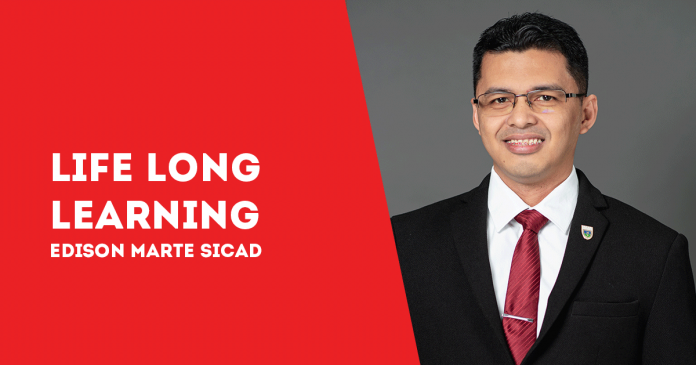
BY EDISON MARTE SICAD
“Excuses sound best to the person who is making them up.”
IF SOME people have the audacity to flaunt their superficial success, there are those who get emotionally entangled with fake failures — and made sure that they post their “trauma” on social media.
The difficulty in defining what success is lies in its subjective and objective aspects. Anyone, based on a personal point of view, can assert that he or she has a successful work, relationship, or life. And no one else can question such declaration — in the same manner that no one else can be forced to believe such success.
The other aspect of success may have a more logical — if not democratic — reason. We have created policies or criteria that had been institutionalized to prevent, as much as possible, any bias in choosing a deserving awardee or winner. With such procedures, we can proclaim an endeavor as successful with society’s approval.
In the world of work, recognition and reputation can go hand in hand in defining success or failure.
But in the field of education, true success is not the only concern. We now have fake failures to deal with. If not tackled properly by parents and teachers, these fake failures can affect the maturity — and integrity — of the students.
To contextualize, some academic or educational apps and Artificial Intelligence models (e.g., ChatGPTs, QuillBot, Grammarly, and other related apps) do not only deprive a student of a hard-earned effort for a successful work, more dangerously, these apps also prevent a student from learning effectively about real failures. In other words, both success and failure can no longer be authentic for a student to own accountability with.
A student learns about writing and composition when his or her essay is returned with corrections. But the problem here is this: would the feedback matter that much if most, if not all, of the “writing” was done by AI?
Anti-thesis
A friend once encouraged me to continue pursuing a master’s degree. I replied that I don’t have the time — and the inclination — to finish a research output. That friend then told me that there is a way of finishing a thesis without really doing the research: I can pay someone else to do it for me — from the initial PowerPoint presentations up to the binding. This friend also assured me that I won’t get into any trouble because such a practice is known — and thus, practically an accepted procedure—among students and teachers.
Living against deadlines
While working on something for the past few days, I noticed that I have a negative reaction to deadlines — especially when they are set by someone else.
But then I realized that I could turn this into a challenge: an opportunity for me to become more efficient and mature.
Now, I am experimenting with this idea — and getting inspired in its application. I am now learning the habit of “bring it on” mentality. So, after a task and its deadline are given, I would then challenge myself to come up of ways of not only finishing the given job on time but, if possible, ahead of time.
Also, while doing a task, I think of ways as to how to make the process better or smarter for the succeeding tasks. I told myself that if I appreciate upgrades in products, I must also get excited in having personal upgrades: sort of installing improvement habits instead of stalling personal progress.
Working (lazily) for money
I would often hear people say, “I don’t have enough money.”
I seldom hear people say, “I will work harder than ever before so that I will have all the money I want.”
To contextualize, there is such a thing as Salary Grade, or Promotional Ranking. Generally, to have a bigger paycheck, an employee can do his or her present work with an aim to be qualified to a higher paycheck.
This is a simple but complex process. Simple because the requirements and criteria are readily available to any interested person. Moreover, the employee can already have a glimpse of the demand of the future work he or she is aiming at by observing the people around him or her.
The complexity is in the process, or the politics involve in getting hired. Somehow, the adage is true: It is all about what and whom you know.
Some people may disagree with this, but there is enough or more than sufficient money just by working here in our country.
A scenario: What if a rich man has told you that if you can work for him Monday to Saturday at 6am until 6pm for five years at minimum wage, then in your retirement, he will give you a 500k monthly pension, will you accept his offer?
A sad fact is that we can actually work harder for someone else. I had experienced this. I told myself, “Wow, if I can work this hard for someone else’s big project, why can’t I exert the same effort for my own personal growth?
Maybe because I was too scared to fail on my own. And thus, treat my effort as wasted actions. At least, in working for someone else, I won’t be personally embarrassed if mistakes happen.
But I think I missed the point. For although we may be working with and for other people, the entire awareness of our work experience is a personal matter. And thus, fundamentally, we are working for our own self./PN







